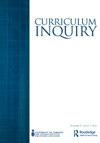Composting (in) the gender studies classroom: Growing feminisms for climate changing pedagogies
IF 1.6
3区 教育学
Q2 EDUCATION & EDUCATIONAL RESEARCH
引用次数: 0
Abstract
Abstract Drawing on our experience co-teaching an undergraduate unit called “Gender and Environment,” we argue for an expansive feminist approach to teaching climate change that embodies the content of the unit in its classroom practice. This requires: (a) understanding the classroom not as separate from the phenomenon of climate change but as one of its sites, striated by the diverse bodies, histories, and other materialities that comprise it; (b) a rigorous understanding of climate change as a feminist issue, inseparable from crises of colonialism, white supremacy, patriarchal power, and violent body normativities; and (c) a commitment to responsive and accountable pedagogies. Here, the feminist environmental humanities concept and method of “composting” (Hamilton & Neimanis, 2018) helps describe how environmental matters can be mulched together with key social justice concepts and insights in order to nourish new possibilities for climate change pedagogies. Composting thus becomes a metaphoric guide for how we configure the work of teaching climate change—not as masterful dissemination of privileged knowledge but as a co-worlded pedagogy that learns from intersectional, anticolonial, queer, and crip perspectives. This pedagogy thus also contributes to growing more accountable and responsive feminisms within and beyond the classroom. The first half of this article explores how an understanding of both climate change and composting manifest in the context of our co-taught unit. In the second half, we offer a scrapbook—produced with care and joy but necessarily condensed and incomplete—that exemplifies some of the ways that we put this framing into practice.性别研究课堂上的堆肥:气候变化教学中日益增长的女权主义
摘要:根据我们共同教授一门名为“性别与环境”的本科单元的经验,我们主张采用一种广泛的女权主义方法来教授气候变化,将该单元的内容体现在课堂实践中。这就要求:(a)不能将教室与气候变化现象分开,而应将其视为一个场所,由构成教室的各种实体、历史和其他物质构成;(b)对气候变化作为女权主义问题的严格理解,与殖民主义、白人至上主义、父权和暴力身体正常化的危机密不可分;(c)致力于响应和负责任的教学方法。在这里,女权主义的环境人文概念和“堆肥”方法(Hamilton & Neimanis, 2018)有助于描述如何将环境问题与关键的社会正义概念和见解结合起来,从而为气候变化教学法提供新的可能性。因此,堆肥成为了我们如何配置气候变化教学工作的隐喻指南——不是作为特权知识的熟练传播,而是作为一种从交叉、反殖民、奇怪和拙劣的观点中学习的共同世界的教学方法。因此,这种教学法也有助于在课堂内外培养更负责任和更积极的女权主义。本文的前半部分探讨了如何理解气候变化和堆肥在我们共同教学单元的背景下表现出来。在第二部分,我们提供了一个剪贴簿,制作过程小心而愉快,但必然是浓缩和不完整的,这是我们将这个框架付诸实践的一些方式的例子。
本文章由计算机程序翻译,如有差异,请以英文原文为准。
求助全文
约1分钟内获得全文
求助全文
来源期刊

Curriculum Inquiry
EDUCATION & EDUCATIONAL RESEARCH-
CiteScore
3.10
自引率
17.60%
发文量
37
期刊介绍:
Curriculum Inquiry is dedicated to the study of educational research, development, evaluation, and theory. This leading international journal brings together influential academics and researchers from a variety of disciplines around the world to provide expert commentary and lively debate. Articles explore important ideas, issues, trends, and problems in education, and each issue also includes provocative and critically analytical editorials covering topics such as curriculum development, educational policy, and teacher education.
 求助内容:
求助内容: 应助结果提醒方式:
应助结果提醒方式:


